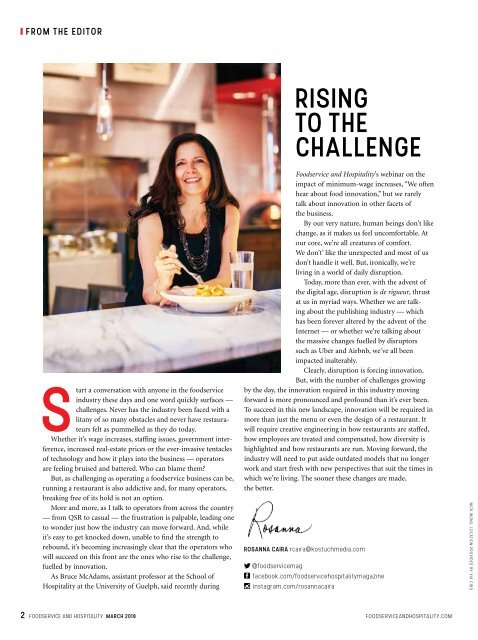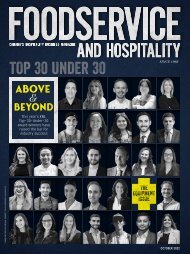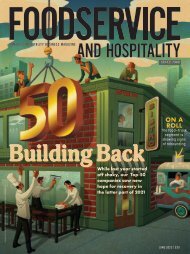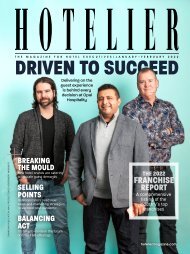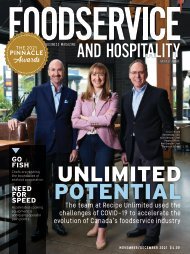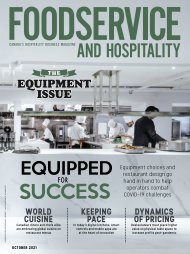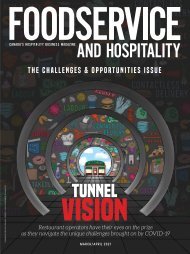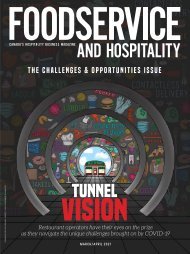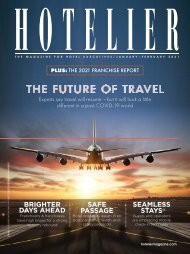March 2018 Digital Issue
You also want an ePaper? Increase the reach of your titles
YUMPU automatically turns print PDFs into web optimized ePapers that Google loves.
FROM THE EDITOR<br />
Start a conversation with anyone in the foodservice<br />
industry these days and one word quickly surfaces —<br />
challenges. Never has the industry been faced with a<br />
litany of so many obstacles and never have restaurateurs<br />
felt as pummelled as they do today.<br />
Whether it’s wage increases, staffing issues, government interference,<br />
increased real-estate prices or the ever-invasive tentacles<br />
of technology and how it plays into the business — operators<br />
are feeling bruised and battered. Who can blame them?<br />
But, as challenging as operating a foodservice business can be,<br />
running a restaurant is also addictive and, for many operators,<br />
breaking free of its hold is not an option.<br />
More and more, as I talk to operators from across the country<br />
— from QSR to casual — the frustration is palpable, leading one<br />
to wonder just how the industry can move forward. And, while<br />
it’s easy to get knocked down, unable to find the strength to<br />
rebound, it’s becoming increasingly clear that the operators who<br />
will succeed on this front are the ones who rise to the challenge,<br />
fuelled by innovation.<br />
As Bruce McAdams, assistant professor at the School of<br />
Hospitality at the University of Guelph, said recently during<br />
RISING<br />
TO THE<br />
CHALLENGE<br />
Foodservice and Hospitality’s webinar on the<br />
impact of minimum-wage increases, “We often<br />
hear about food innovation,” but we rarely<br />
talk about innovation in other facets of<br />
the business.<br />
By our very nature, human beings don’t like<br />
change, as it makes us feel uncomfortable. At<br />
our core, we’re all creatures of comfort.<br />
We don’t’ like the unexpected and most of us<br />
don’t handle it well. But, ironically, we’re<br />
living in a world of daily disruption.<br />
Today, more than ever, with the advent of<br />
the digital age, disruption is de rigueur, thrust<br />
at us in myriad ways. Whether we are talking<br />
about the publishing industry — which<br />
has been forever altered by the advent of the<br />
Internet — or whether we’re talking about<br />
the massive changes fuelled by disruptors<br />
such as Uber and Airbnb, we’ve all been<br />
impacted inalterably.<br />
Clearly, disruption is forcing innovation.<br />
But, with the number of challenges growing<br />
by the day, the innovation required in this industry moving<br />
forward is more pronounced and profound than it’s ever been.<br />
To succeed in this new landscape, innovation will be required in<br />
more than just the menu or even the design of a restaurant. It<br />
will require creative engineering in how restaurants are staffed,<br />
how employees are treated and compensated, how diversity is<br />
highlighted and how restaurants are run. Moving forward, the<br />
industry will need to put aside outdated models that no longer<br />
work and start fresh with new perspectives that suit the times in<br />
which we’re living. The sooner these changes are made,<br />
the better.<br />
ROSANNA CAIRA rcaira@kostuchmedia.com<br />
@foodservicemag<br />
facebook.com/foodservicehospitalitymagazine<br />
instagram.com/rosannacaira<br />
NICK WONG, LOCATION PROVIDED BY VIA CIBO<br />
2 FOODSERVICE AND HOSPITALITY MARCH <strong>2018</strong> FOODSERVICEANDHOSPITALITY.COM


